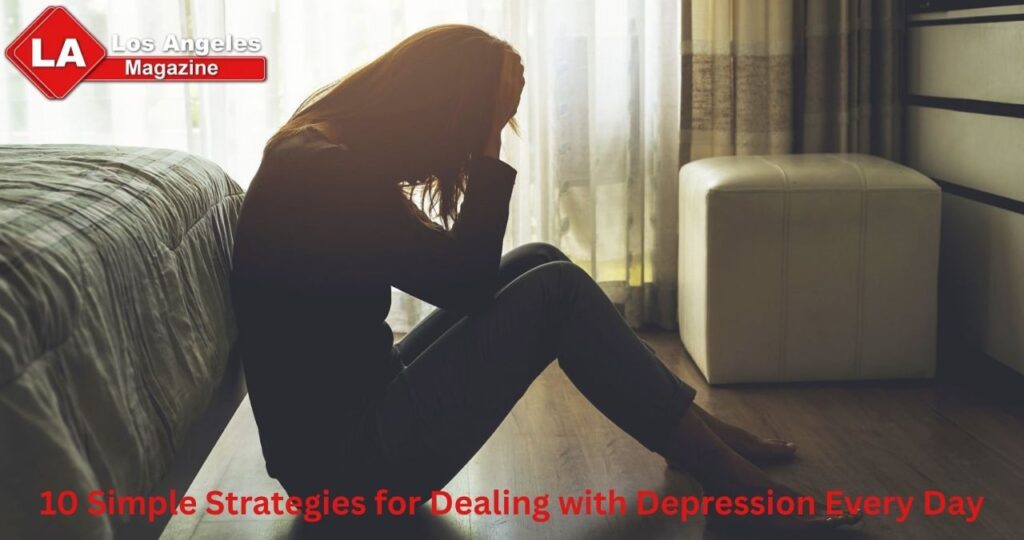Imagine waking up, the world outside feels heavy. Even small things, like getting out of bed or making coffee, seem too much. This daily drag, that constant weight, can make simple tasks feel like climbing a mountain. It’s a struggle many people face when depression settles in.
Depression is more than just feeling sad for a day or two. It’s a persistent mood disorder that touches every part of your life. It saps your energy, steals your joy, and changes how you think and feel. While depression is serious and sometimes needs help from a doctor or therapist, you don’t have to face it alone. Small, steady steps each day can really improve your quality of life. This article will show you 10 easy ways to help manage depression’s grip every single day.
Understanding the Daily Impact of Depression
The Invisible Weight of Depression
When you live with depression, it’s like carrying an unseen burden. This weight makes everyday life hard to handle. You might feel a constant tiredness, even after a full night’s sleep. Your mind might wander, making it tough to focus on work or conversations. Tasks that used to be simple, like doing dishes or running errands, can feel huge and impossible. This mood disorder can mess with your sleep, either making you sleep too much or not enough. It also drains your desire to do anything, leaving you stuck.
Recognizing Subtle Signs Beyond Sadness
Depression shows up in many ways, not just as sadness. Sometimes, you might feel angry or easily annoyed by small things. Losing interest in hobbies you once loved is another common sign. Your appetite might change too, leading you to eat more or less than usual. A deep fatigue, where your body feels heavy all the time, is also a sign. You might even feel worthless or guilty for no clear reason. These are all subtle clues that depression might be at play, extending past just feeling down.
Strategy 1: Prioritize Movement and Physical Activity
The Mind-Body Connection in Depression Management
Your body and mind are deeply linked. What you do with one often affects the other. When you move your body, your brain releases natural chemicals called endorphins. These act like your body’s own mood boosters and pain relievers. Studies even show that regular exercise can work as well as some medicines for mild depression. Getting active helps calm your mind and can lift your spirits.
Incorporating Small, Achievable Movements
You don’t need to run a marathon to feel better. Small bits of movement throughout your day can make a big difference. Try taking a short 10-minute walk outside, even just around the block. You could do some gentle stretches in your living room. Putting on your favorite song and dancing for a few minutes is also a great idea. Just standing up and moving around every hour, instead of sitting still, adds up. The goal is to move your body every day, even if it’s just a little bit.
Strategy 2: Cultivate Mindful Moments and Self-Compassion
Anchoring Yourself in the Present
It’s easy for your mind to get stuck on worries or past regrets when you’re feeling low. Mindfulness helps you bring your focus back to the now. Simple breathing exercises are a good start. Just pay attention to each breath as it comes in and out. You can also mindfully observe your surroundings, noticing sounds, sights, and smells. Eating a snack slowly, paying attention to its taste and texture, is another mindful practice. The point is just to notice things, not to judge them.
Practicing Self-Kindness
Often, we are our own harshest critics. Self-compassion means treating yourself with the same care you would offer a good friend. When you’re struggling, tell yourself kind words. Acknowledge the effort you put in, no matter how small. Say things like, “It’s okay to feel this way,” or “You’re doing your best.” Giving yourself understanding and warmth helps fight off feelings of guilt and shame.
Strategy 3: Structure Your Day with Small Goals
Building Momentum Through Achievable Tasks
When depression makes everything feel huge, break things down. Setting up a daily routine with small goals can help. Instead of thinking “I need to clean the whole kitchen,” try “I will load five dishes into the dishwasher.” This makes the task much less scary. Dividing big jobs into tiny, doable steps reduces that overwhelming feeling.
The Power of Small Wins
Completing even very small tasks gives you a sense of achievement. Each tiny win builds up your confidence and creates positive momentum. Checking off “made the bed” or “drank a glass of water” from a list can make you feel a little bit more in control. These small successes remind you that you can still accomplish things, even when it feels hard. It helps fight off that feeling of being helpless.
Strategy 4: Nurture Social Connections (Even When You Don’t Feel Like It)
Combating Isolation with Connection
Depression often makes you want to pull away from others. But social interaction, even short talks, helps fight loneliness. It gives you a sense of belonging and reminds you that people care. Research shows that being isolated can make depression worse. Reaching out, even when you don’t feel like it, can really help your mood.
Low-Energy Social Engagement Ideas
You don’t need to go to a big party. Simple connections can be very powerful. Send a quick text message to a friend saying hello. Make a brief phone call to a family member, just to chat for a few minutes. Joining an online support group can also give you a sense of community. Focus on quality over how many people you talk to. Even one meaningful connection can brighten your day.
Strategy 5: Prioritize Sleep Hygiene and Rest
The Critical Link Between Sleep and Mood
Sleep plays a huge role in how you feel emotionally. Not getting enough, or getting too much, can throw your mood off balance. Establishing good sleep habits is key to managing depression. A rested body and mind are better equipped to handle daily challenges.
Establishing a Consistent Sleep Schedule
Try to go to bed and wake up around the same time every day. This includes weekends. This helps your body’s internal clock stay on track. A regular sleep schedule trains your body to expect rest at a certain time. This makes it easier to fall asleep and wake up feeling more refreshed.
Creating a Relaxing Bedtime Routine
What you do before bed matters. Avoid screens like phones, tablets, or TVs for an hour or so before you sleep. The blue light can keep you awake. Instead, take a warm bath, read a calming book, or listen to soft music. These activities tell your body it’s time to wind down. A peaceful routine signals to your mind that it’s time to rest.
Strategy 6: Engage Your Senses Through Pleasant Activities
Reconnecting with Joy Through Sensory Experiences
Depression can make life feel dull and gray. Reawakening your senses can help bring back small moments of joy. Find activities that bring you comfort or a tiny bit of happiness. Listen to your favorite music, really paying attention to the sounds. Spend some time in nature, feeling the sun or the breeze. Sipping a warm cup of tea or cocoa can also be a simple pleasure. These small acts can remind you that good feelings still exist.
Sensory Grounding Techniques
When feelings of sadness or worry feel overwhelming, use your senses to ground yourself. This helps bring you back to the present moment. Try the “5-4-3-2-1” method. Notice five things you can see around you. Then, find four things you can touch, paying attention to their texture. Listen for three things you can hear. Identify two things you can smell. Finally, name one thing you can taste. This quick exercise can calm your mind.
Conclusion
You’ve learned 10 simple strategies for dealing with depression every day. These include moving your body, practicing mindfulness, setting small goals, connecting with others, getting good sleep, and engaging your senses. Remember, these are tools to help manage your symptoms. They work best when you use them often and consistently.
Healing from depression is a journey, not a race. There will be good days and bad days. Be patient with yourself, celebrate small victories, and know that progress is often slow. If your feelings of depression are strong or don’t seem to get better, please reach out for professional help. Talking to a doctor or a therapist can provide you with the support and guidance you need. You deserve to feel better, and help is available.



